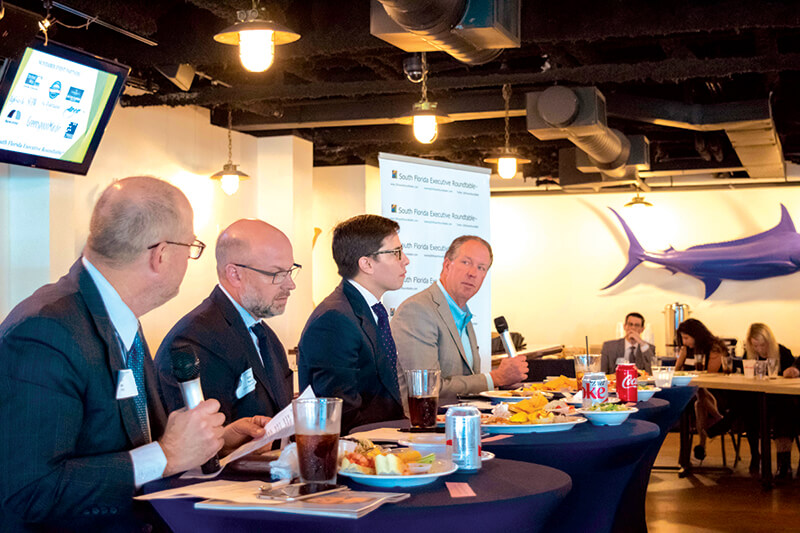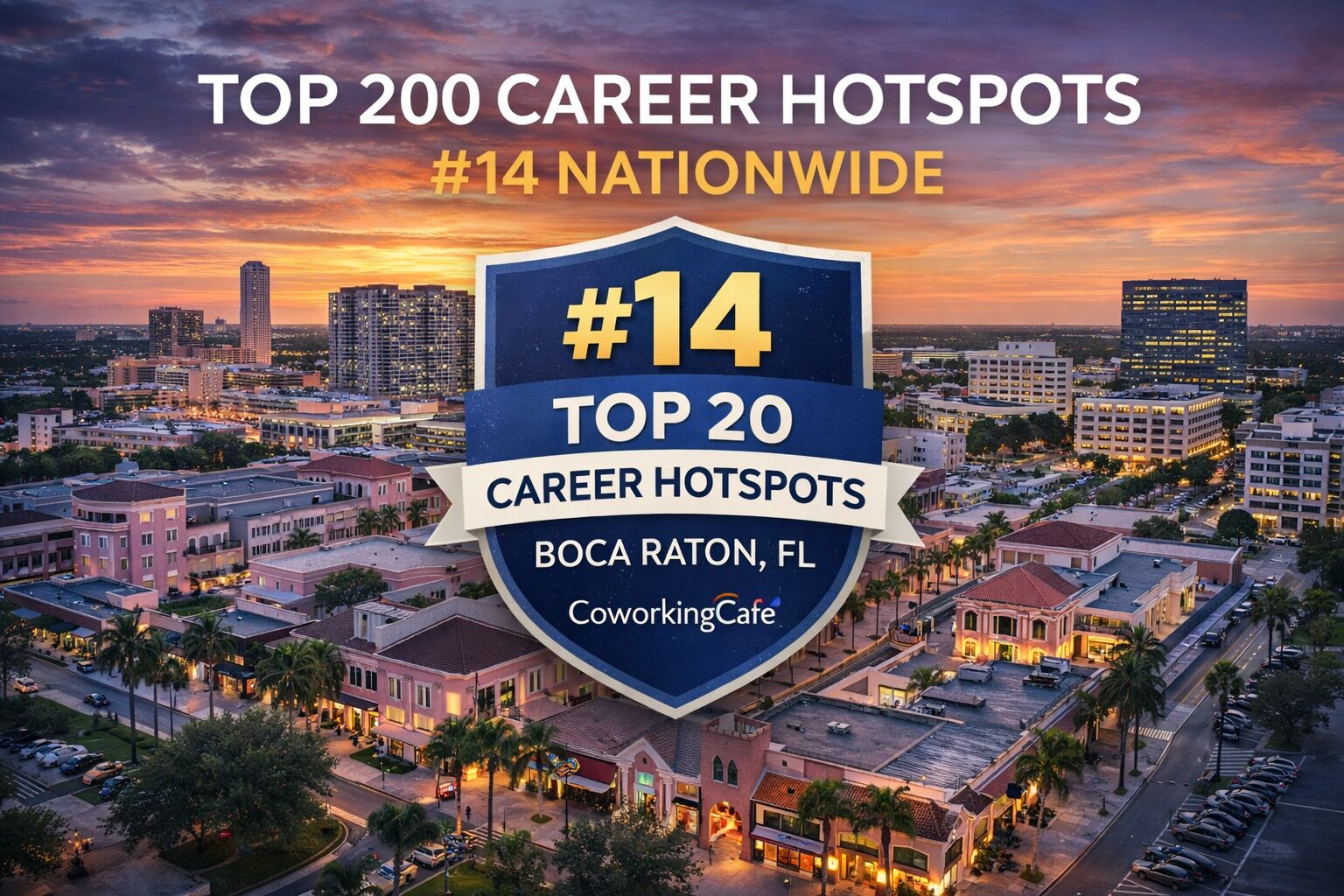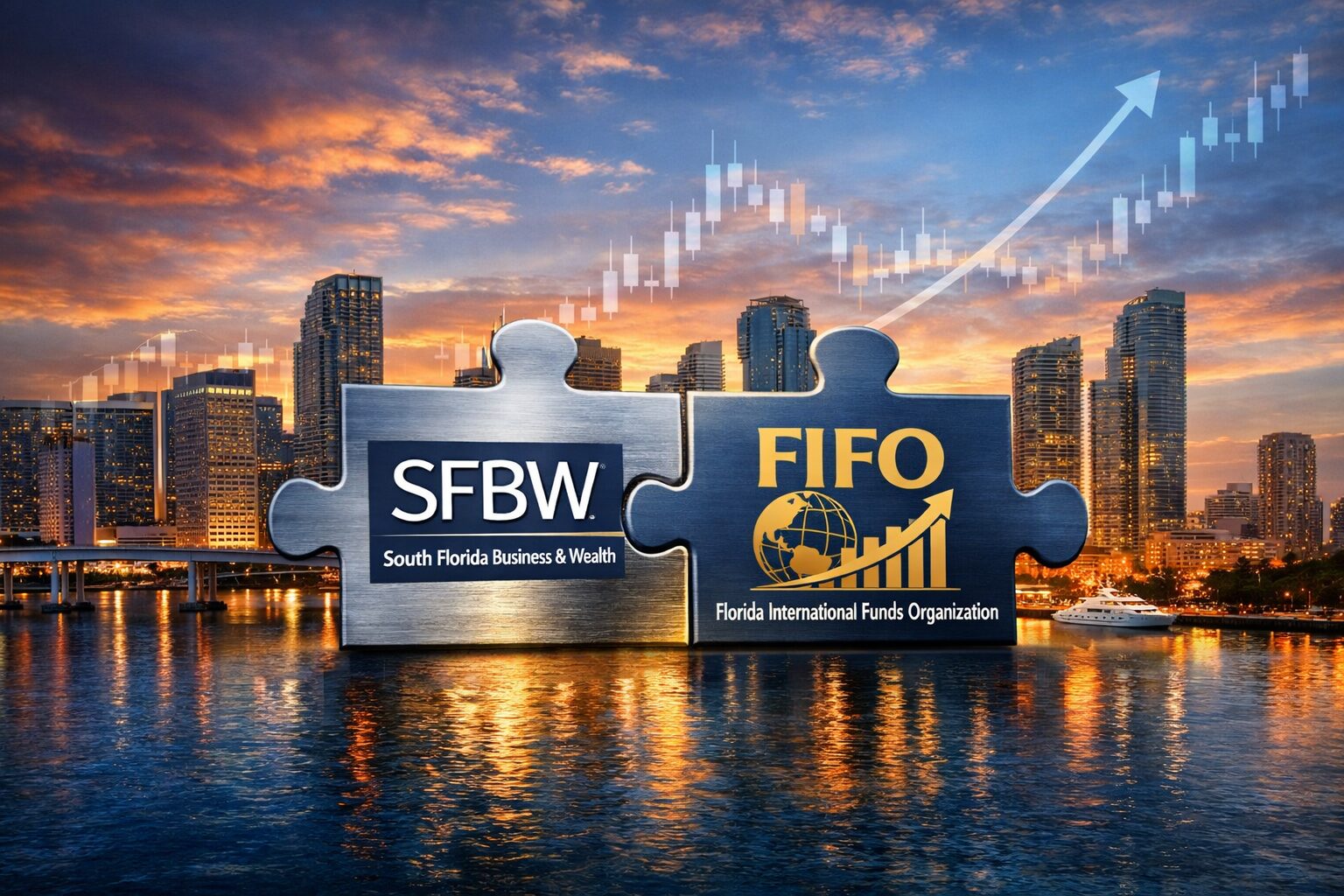Executives discuss workplace misbehaviors and hiring practices
With national headlines reporting the workplace misbehavior of powerful executives, politicians, celebrities and others—and the subsequent fallout—the topic is at the forefront of local business leaders’ minds. During the November Executive Roundtable held at Monty’s in Coconut Grove, the panelists divulged how their organizations approach and address such issues and how an effective hiring process can help eliminate issues down the road. SFBW is the exclusive media sponsor of this executive-level luncheon, in which Editor-in-Chief Kevin Gale served as this edition’s moderator.
The panelists:
• Jim Berra, chief marketing officer and senior vice president at Royal Caribbean International.
• David Prevost, regional director at Wawa.
• Justin Irizarry, co-founder and CFO, OrthoNow.
This transcript has been edited for brevity and clarity.
There are a lot of gas station/convenience stores in South Florida, but none seems to inspire the buzz that Wawa does. What’s your secret sauce?
Prevost: As a convenience store, Wawa has been around for 57 years. The company itself has been around for more than 200 years. It is grounded in our six core values.
One of our core values is valuing people. And we do that in a number of different ways. We are an ESOP [employee stock ownership plan] company. It gives a sense of pride in the company. We give them great benefits.
We have what we call our “associates in need” fund, which is employee-sponsored and the company contributes to it. How it works is that the fund will help folks out when life events occur that might take them from making it to homeless. We will help them, whether it is rent, electricity or funeral arrangements.
We have a lot of great food and products, but when you ask me what makes us so special, it is our associates and the connection they have with our customers and the bond that we build with them in our communities.
One of the keys to success for businesses seems to be finding the right niche these days. How did the founders identify the niche that OrthoNow is pioneering?
Irizarry: When we looked at how orthopedic care was delivered, we saw that, on the supply side, there were either orthopedic doctors giving really good care, but patients couldn’t get in front of them in a reasonable amount of time, or there were suppliers who were giving general care and offering convenience. And if you grabbed those two things together, there was this entire blue ocean at the intersection of convenience and expert care. Nobody was playing in that space. And that’s the space we decided to play in, and it doesn’t end there.
We make it really easy for the patient to come to us. If a patient gets injured, they can use our app and have an Uber come and pick them up and bring them to one of our centers.
There are a lot of headlines these days about inappropriate behavior in the workplace and misbehavior by powerful people. What does your company do to create a culture that fosters inclusiveness and makes people comfortable in the workplace?
Prevost: For us, we have different mechanisms set up for the associates. We have ethics hotlines; we have our HR department; we have associate relations specialists out in the field that they can reach out to. And we have a zero-tolerance policy.
Irizarry: I think it is two things. For one, we have to hire correctly. That’s a big part of it. In terms of prevention, culture is a big part of it. There’s a spirit inside of OrthoNow that we are sort of renegades, radical thinkers, and we want radical thinkers. And I think with that comes individuals who are generally more outspoken and more unwilling to accept certain norms within a workplace. I think it starts there.
There also seems to be a theme in all of these allegations that we are hearing about in the news today. I think [comedian] Louis C.K. and his apology hit on a very important point. There was this element of positional power where victims don’t feel as if they actually have a choice. If you look at our organization, even right down to the unit level, there’s not a lot of positional power. There’s certainly a hierarchy.
Again, the culture we have is that somebody who is checking in a patient can be as outspoken, can be as free to express themselves. This can go on all the way up through our organizational ranks. And I think that goes a long way in helping to eliminate that perceived positional power.
Berra: On the infrastructure side, we do a lot to measure our hiring practices. We measure employee engagement across a number of dimensions, trying to understand that we are not just talking the talk, but we are also walking the walk, in terms of inclusiveness. We now have an executive who is in charge of diversity and inclusion.
I sit on a board, as do another number of executives, reviewing the metrics and the findings. We also have a hotline for people to voice a complaint, on our ship side and shore side. But I do think it really comes down to what Justin said, which is the hiring and character.
Hopefully, people will feel much more empowered to raise issues when they arise and recognize that is the right thing to do, and that is something that can only make that organization or environment better.
We have to do a better job at looking at character. If you are seeing, not necessarily harassment-type behaviors but even behaviors like abuse of power or bullying or a bull in the china shop, we need to work early on to start to reset how people approach collaboration.
Because as we talk about innovation today, the key to it is really collaboration. The days of Edison sitting in a room by himself, inventing the light bulb, are long gone. The ability to collaborate comes down to how you are able to adapt, how you communicate, and the character in which you walk into the room.
What do you to do ensure that your new key hires have vision and values that are in line with your company?
Berra: In the last year, we implemented something called the Royal Way, which is an attempt to codify our values and our character. It is pulled through from the recruiting process to how we onboard and begin to develop and manage our talent.
I think traditionally different ships were operating based on the character of their leader. It was a bit more autonomous—even on the shore side, because we have multiple brands and locations—so it was more entrepreneurial. What we wanted to do was standardize what we are looking for, how we want to think, how we want to treat each other and obviously how we want to treat our guests. I think starting with a strong foundation—which, it sounds, Wawa has as well—is really key to the onboarding process.
You mentioned that sometimes there can be the person who is the bull in the china shop. How do you handle these situations? Sometimes the bull in the china shop can be an incredibly valuable employee in other ways and you just don’t want to get rid of them.
Berra: I think that’s the balance. You don’t want to take the drive or ambition out of the team member, but at the same time, you want to teach them a better way to go about it. You’re not drowning out other voices or making people feel like they are not a part of the process. We have more work to do here, and instead of having a twice-a-year management career discussion, I think we should have it much more frequently.
I try to make a point with my direct reports and leadership team, that if I am seeing that behavior, then we need to immediately have that discussion. Grab a cup of coffee, try to keep it informal and just say, “Hey, listen. I think there’s a better way to have gone about this. You may not have recognized this in the moment, because you were energetic, you were passionate, you were promoting your idea—all good things—but the way you went about it tended to crowd out other points of view and probably made the discussion less fruitful than it could have been.”
What do you guys do to ensure new hires share your organization’s vision and values?
Irizarry: We developed a list of questions that are experiential in nature. And then we have different members of the team touch on or probe around those experiences. What that allows us to do is ensure that the answers we are getting and the fit we are perceiving is actually the fit that we are going to get. That has been pretty effective for us. It’s also not uncommon for us to ask an individual to hang out for a day.
Prevost: We recommend and encourage people to go and visit our stores. When we are interviewing for management, we want to understand that it is about value-based decision-making. If they are an external hire, we do ask questions about their current company’s management styles, and then we compare and contrast that to what they saw in the store and what they were able to pull out of the store. And it is very telling, a lot of the times, what they are focused on. People will come in and try to tell you how to do your business better, but not talk to our associates or people at all. That doesn’t fit our culture. We are very unique in that we can send them in and sort of try them out without actually hiring them.↵








